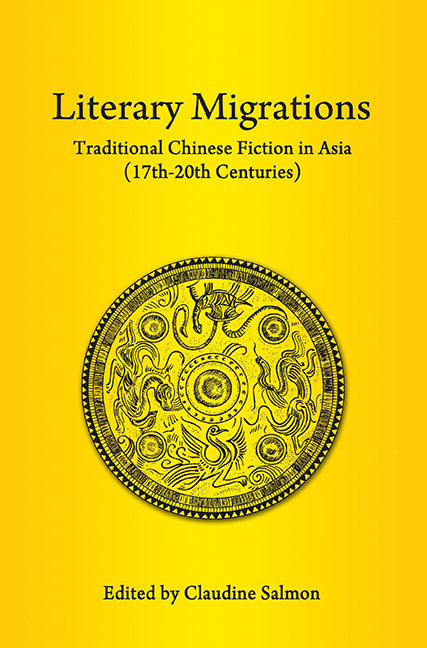Book contents
- Frontmatter
- Contents
- FOREWORD
- Dr Salmon as I Know her
- Preface to Reprint Edition
- Acknowledgements
- INTRODUCTION
- PART I KOREA AND JAPAN
- PART II MAINLAND NORTHEAST ASIA
- PART III MAINLAND SOUTHEAST ASIA
- PART IV INSULAR SOUTHEAST ASIA
- 10 A Note on Javanese Works Derived from Chinese Fiction
- 11 Malay Translations of Chinese Fiction in Indonesia
- 12 Writings in Romanized Malay by the Chinese of Malaya — A Preliminary Inquiry
- 13 Lie Sie Bin Yoe Tee Hoe — Six Malay/Indonesian Translations of a Chinese Tale
- 14 Liang Shanbo yu Zhu Yingtai — A Chinese Folk Romance in Java and Bali
- 15 Translations of Chinese Fiction into Makassarese
- 16 Sam Pek Eng Tay — A Chinese Love Story in Madurese
- 17 Post-war Kung Fu Novels in Indonesia — A Preliminary Survey
- Bibliography
- Author, story-teller and translator index
- Title index
- List of Plates
- Contributors
- Plate section
16 - Sam Pek Eng Tay — A Chinese Love Story in Madurese
from PART IV - INSULAR SOUTHEAST ASIA
Published online by Cambridge University Press: 21 October 2015
- Frontmatter
- Contents
- FOREWORD
- Dr Salmon as I Know her
- Preface to Reprint Edition
- Acknowledgements
- INTRODUCTION
- PART I KOREA AND JAPAN
- PART II MAINLAND NORTHEAST ASIA
- PART III MAINLAND SOUTHEAST ASIA
- PART IV INSULAR SOUTHEAST ASIA
- 10 A Note on Javanese Works Derived from Chinese Fiction
- 11 Malay Translations of Chinese Fiction in Indonesia
- 12 Writings in Romanized Malay by the Chinese of Malaya — A Preliminary Inquiry
- 13 Lie Sie Bin Yoe Tee Hoe — Six Malay/Indonesian Translations of a Chinese Tale
- 14 Liang Shanbo yu Zhu Yingtai — A Chinese Folk Romance in Java and Bali
- 15 Translations of Chinese Fiction into Makassarese
- 16 Sam Pek Eng Tay — A Chinese Love Story in Madurese
- 17 Post-war Kung Fu Novels in Indonesia — A Preliminary Survey
- Bibliography
- Author, story-teller and translator index
- Title index
- List of Plates
- Contributors
- Plate section
Summary
Among the reading materials for the people published by Balai Pustaka, the publishing house set up by the Dutch East Indies government in 1908, we find some ninety-odd titles published in Madurese, the language of the people of the island of Madura and the easternmost part of East Java, where people from the island have been migrating for centuries.
Among this collection of publications, we find two volumes written in Javanese script, containing the Chinese love story of Liang Shanbo and Zhu Yingtai, a story that has been quite popular among the different peoples living in the Archipelago. The volumes are numbered 840 and 840a, and comprise a unified whole. On the title-page we read, besides the title in roman script, the subtitle Tresna Dhunnya Aherat, which means “Eternal Love” (lit. Love in this World and the After-life), Further, we can read that it is an ancient story in China (dhungeng kona e naghara Tiong Kok), written in Madurese (eangghit něng bhasa Madhura) by (biq) R. Ahmad Wongsoséwojo (Ra. Ahmad Wongsasewaya). There are six illustrations signed by an S. Hadi interspersed in the two volumes. The Javanese script used is of the standing and cursive print styles, with the latter style being used only in the captions underneath the illustrations and the fine-print phrases on the title page. All Chinese names are printed in roman script, with typographical errors in some places. (See Plates 40 and 41.)
The core story is a love story between the girl Zhu Yingtai, who disguises herself as a boy to be able to go to school, and the boy Liang Shanbo, whom she meets on the way and later falls in love with, which ends in tragedy because she has been given into marriage by her parents to someone else of the Ma family. Liang Shanbo dies and later on Zhu Yingtai prays at his grave and jumps in when it splits open. In China, where it originated, the story has been known since the fourth century A.D. Out of this core story many versions have been spun following diverse imaginative interpreters in China itself and in other lands.
- Type
- Chapter
- Information
- Literary MigrationsTraditional Chinese Fiction in Asia (17th–20th Centuries), pp. 375 - 392Publisher: ISEAS–Yusof Ishak InstitutePrint publication year: 2013

